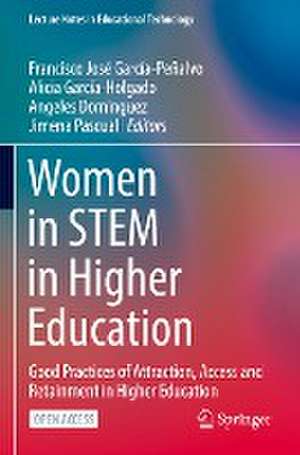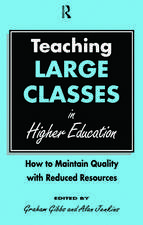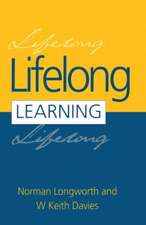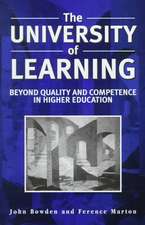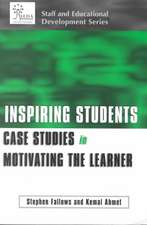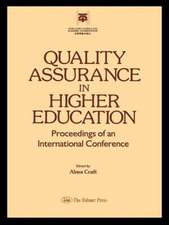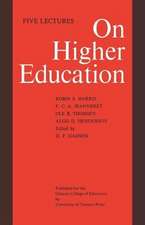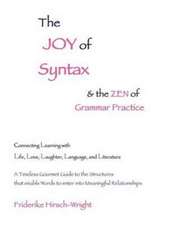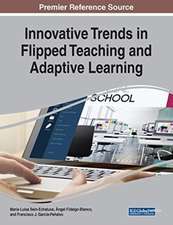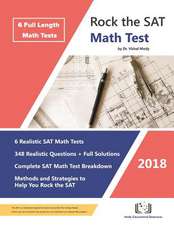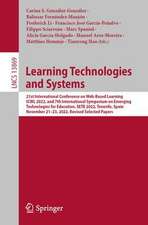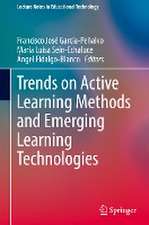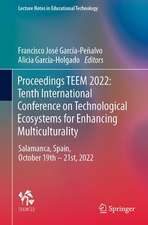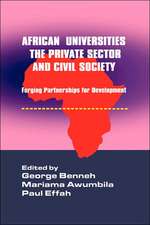Women in STEM in Higher Education: Good Practices of Attraction, Access and Retainment in Higher Education: Lecture Notes in Educational Technology
Editat de Francisco José García-Peñalvo, Alicia García-Holgado, Angeles Dominguez, Jimena Pascualen Limba Engleză Paperback – 25 mai 2022
| Toate formatele și edițiile | Preț | Express |
|---|---|---|
| Paperback (1) | 350.12 lei 6-8 săpt. | |
| Springer Nature Singapore – 25 mai 2022 | 350.12 lei 6-8 săpt. | |
| Hardback (1) | 359.76 lei 3-5 săpt. | +26.15 lei 6-10 zile |
| Springer Nature Singapore – 25 mai 2022 | 359.76 lei 3-5 săpt. | +26.15 lei 6-10 zile |
Din seria Lecture Notes in Educational Technology
-
 Preț: 349.91 lei
Preț: 349.91 lei -
 Preț: 359.76 lei
Preț: 359.76 lei -
 Preț: 397.97 lei
Preț: 397.97 lei - 18%
 Preț: 898.43 lei
Preț: 898.43 lei - 20%
 Preț: 1006.07 lei
Preț: 1006.07 lei - 20%
 Preț: 820.60 lei
Preț: 820.60 lei - 15%
 Preț: 647.27 lei
Preț: 647.27 lei - 15%
 Preț: 699.45 lei
Preț: 699.45 lei - 15%
 Preț: 633.31 lei
Preț: 633.31 lei - 18%
 Preț: 945.62 lei
Preț: 945.62 lei - 20%
 Preț: 597.45 lei
Preț: 597.45 lei - 20%
 Preț: 580.53 lei
Preț: 580.53 lei - 15%
 Preț: 702.16 lei
Preț: 702.16 lei - 15%
 Preț: 644.82 lei
Preț: 644.82 lei - 15%
 Preț: 650.69 lei
Preț: 650.69 lei - 24%
 Preț: 804.33 lei
Preț: 804.33 lei - 18%
 Preț: 1003.38 lei
Preț: 1003.38 lei - 15%
 Preț: 647.08 lei
Preț: 647.08 lei - 18%
 Preț: 947.85 lei
Preț: 947.85 lei - 15%
 Preț: 643.48 lei
Preț: 643.48 lei - 18%
 Preț: 999.45 lei
Preț: 999.45 lei - 18%
 Preț: 1102.03 lei
Preț: 1102.03 lei - 18%
 Preț: 891.80 lei
Preț: 891.80 lei - 18%
 Preț: 1002.94 lei
Preț: 1002.94 lei -
 Preț: 393.90 lei
Preț: 393.90 lei - 18%
 Preț: 790.77 lei
Preț: 790.77 lei - 18%
 Preț: 946.41 lei
Preț: 946.41 lei - 18%
 Preț: 784.92 lei
Preț: 784.92 lei - 15%
 Preț: 643.99 lei
Preț: 643.99 lei - 15%
 Preț: 643.00 lei
Preț: 643.00 lei - 15%
 Preț: 644.63 lei
Preț: 644.63 lei - 24%
 Preț: 818.24 lei
Preț: 818.24 lei - 18%
 Preț: 902.36 lei
Preț: 902.36 lei - 18%
 Preț: 952.72 lei
Preț: 952.72 lei - 18%
 Preț: 942.44 lei
Preț: 942.44 lei -
 Preț: 387.96 lei
Preț: 387.96 lei - 18%
 Preț: 1001.50 lei
Preț: 1001.50 lei - 15%
 Preț: 647.59 lei
Preț: 647.59 lei - 15%
 Preț: 642.83 lei
Preț: 642.83 lei
Preț: 350.12 lei
Nou
Puncte Express: 525
Preț estimativ în valută:
67.00€ • 72.76$ • 56.28£
67.00€ • 72.76$ • 56.28£
Carte tipărită la comandă
Livrare economică 23 aprilie-07 mai
Preluare comenzi: 021 569.72.76
Specificații
ISBN-13: 9789811915543
ISBN-10: 9811915547
Pagini: 197
Ilustrații: XIV, 197 p. 19 illus., 17 illus. in color.
Dimensiuni: 155 x 235 mm
Greutate: 0.3 kg
Ediția:1st ed. 2022
Editura: Springer Nature Singapore
Colecția Springer
Seria Lecture Notes in Educational Technology
Locul publicării:Singapore, Singapore
ISBN-10: 9811915547
Pagini: 197
Ilustrații: XIV, 197 p. 19 illus., 17 illus. in color.
Dimensiuni: 155 x 235 mm
Greutate: 0.3 kg
Ediția:1st ed. 2022
Editura: Springer Nature Singapore
Colecția Springer
Seria Lecture Notes in Educational Technology
Locul publicării:Singapore, Singapore
Cuprins
A model for bridging the gender gap in STEM in higher education institutions.- A Review of Irish National Strategy for Gender Equality in Higher Education 2010-2021.- Making and taking leadership in the promotion of gender desegregation in STEM.- Reflections on Selected Gender Equality in STEM Initiatives in an Irish University.- Balance4Better: "We Are HERe" more than a gender campaign.- Promoting the participation of women in STEM: A methodological view.- Women retention in STEM Higher Education: Systematic Mapping of Gender Issues.- Mentoring of female students in engineering as a way of caring.- Gender perspective in STEM disciplines in Spain universities.- Examples of good practices in Erasmus+ projects that integrate gender and STEM in Higher Education.
Notă biografică
Francisco José García-Peñalvo is Full Professor in the Department of Computer Science and Automation at the University of Salamanca (USAL), Spain, with three six-year periods of research, one six-year period of transferring and innovation, and four five-year periods of recognized teaching. He received the Beatriz Galindo award for teaching excellence in 2019. Since 2006 he has been the head of the Research Group Recognized by the USAL GRIAL (research GRoup on InterAction and eLearning). He was Vice-Dean of Innovation and New Technologies of the Faculty of Sciences of the USAL between 2004 and 2007 and Vice-Rector of Technological Innovation of this University between 2007 and 2009. He is currently the Rector's Delegate for Virtual Teaching and the Coordinator of the Doctorate Programme in Education in the Knowledge Society at USAL. He has published more than 100 research papers in JCR-indexed journal.
Alicia García-Holgado received the degree in Computer Sciences (2011), a M.Sc. in Intelligent Systems (2013) and a Ph.D. (Cum Laude) (2018) from the University of Salamanca, Spain. She is Assistant Professor at the Computer Science Department and member of the GRIAL Research Group of the University of Salamanca since 2009, where she currently leads the research line "Social Responsibility and Inclusion". Her research is related to the development of technological ecosystems for knowledge and learning processes management in heterogeneous contexts, and the gender gap in the STEM areas. Noteworthy the organization and participation in a large number of international activities aimed at reducing the gender gap in STEM. She is currently part of the coordinating team in the W-STEM project and researcher in the CreaSTEAM project, both funded by the European Commission and focused on creating inclusive spaces in education and reducing the gender gap in STEM. She is a board member of the Women in Computing Committee of the Spanish Computing Scientific Society and sub-coordinator of the CLEI Community for Latin American women in computing.
Angeles Dominguez is Associate Dean of Faculty Development of the School of Medicine and Health Sciences, professor of the School of Humanities and Education, and researcher of the Institute for the Future of Education at Tecnologico de Monterrey. Angeles holds a bachelor's in Physics Engineer from the Tecnologico de Monterrey and a Ph.D. in Mathematics Education from Syracuse University, New York. She is a member of the National System of Researchers for her research, SNI-2 (2020–2023). Dr. Dominguez is a member of the interdisciplinary research group SOI-STEM (Socially Oriented Interdisciplinary STEM Education), where she co-leads the Diversity, Equity and Inclusion research line. Her main research areas are interdisciplinary education, gender studies in STEM, and faculty development.
Jimena Pascual is Associate Professor of the School of Industrial Engineering at the Pontificia Universidad Católica de Valparaíso (PUCV), Chile. She holds Ph.D. and M.S.I.E. degrees in industrial engineering from Purdue University, USA, and an industrial engineering degree from PUCV. Her research interests include the mathematical modeling and simulation of logistics and health systems, as well as research in engineering education with social justice and systems thinking perspectives. Her recent collaboration projects include modeling logistics processes related to port operations, optimizing coverage and path planning of unmanned vehicle search-and-rescue missions, and improving engineering education with a focus on innovation and entrepreneurship, social justice and diversity. She leads her university’s participation in the international project “Building the future of Latin America: engaging women into STEM (W-STEM)” funded by the European Union.
Textul de pe ultima copertă
This open access book addresses challenges related to women in STEM in higher education, presenting research, experiences, studies, and good practices associated with the engagement, access, and retention of women in the STEM disciplines. It also discusses strategies implemented by universities and policymakers to reduce the existing gender gap in these areas. The chapters provide an overview of implementations in different regions of the world and provide numerous examples that can be transferred to other higher education institutions.
Caracteristici
Contains examples of mechanisms and strategies to reduce gender bias in STEM Includes practices and initiatives from higher education institutions worldwide Provides a cross-regional experience in Latin America and Europe for engaging more women into STEM This is an open access book
